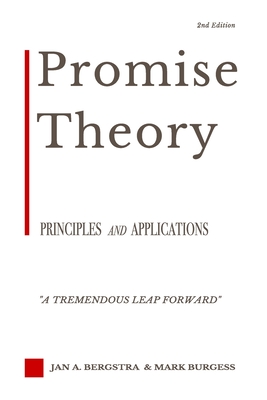Promise Theory: Principles and Applications (Second edition)

Promise Theory: Principles and Applications (Second edition)
Promise Theory bridges the worlds of semantics and dynamics to describe scalable interactions between autonomous agents that form clusters and groups. It provides a broadly developed and semi-formal language, which builds on the mathematics of sets and graphs, and models intent and outcome in an impartial manner. The result is a theory that expresses a chemistry' of cooperative behaviours for a wide range of systems, emphasizing how each new scale of cooperation leads to new phenomena and new promises.This book is aimed at scientists, philosophers, and engineers. It introduces readers to the key concepts in a practical manner, building on the foundation of voluntary cooperation as a ground state for all interacting systems. The book draws on many examples from the real world, with a particular emphasis on human-computer systems. Promise Theory offers a methodology for generating certainty on top of uncertain foundations. This book presents the formal foundations of Promise Theory. It lays out the formalisms in a clear, concise, understandable way that makes them accessible to non-mathematicians. If you want to fully understand the conceptual mechanisms that underlie the distributed systems that make up today's "cloud services", you should start with this book.' -- Jeff Sussna, Author of Designing Delivery [The authors] bring the rigor of theoretical physics to the science of cooperation. The application of this kind of rigor to the social sciences is a tremendous leap forward. [The] pioneering work on developing an algebra of cooperation is an idea whose time has come. A promise is not a guarantee. That said: I promise you that examining this book will stimulate your thinking about cooperation and collaboration at scale. This book covers a lot of ground: promises, impositions, invitations, games, and the peculiar dynamics of authority and authorization. Those looking for a book that applies the lessons of distributed computing to the new and emerging science of cooperation will find what they are looking for here.' -- Daniel Mezick, Author of The Culture Game and Inviting Leadership
PRP: 154.92 Lei
Acesta este Prețul Recomandat de Producător. Prețul de vânzare al produsului este afișat mai jos.
123.94Lei
123.94Lei
154.92 LeiLivrare in 2-4 saptamani
Descrierea produsului
Promise Theory bridges the worlds of semantics and dynamics to describe scalable interactions between autonomous agents that form clusters and groups. It provides a broadly developed and semi-formal language, which builds on the mathematics of sets and graphs, and models intent and outcome in an impartial manner. The result is a theory that expresses a chemistry' of cooperative behaviours for a wide range of systems, emphasizing how each new scale of cooperation leads to new phenomena and new promises.This book is aimed at scientists, philosophers, and engineers. It introduces readers to the key concepts in a practical manner, building on the foundation of voluntary cooperation as a ground state for all interacting systems. The book draws on many examples from the real world, with a particular emphasis on human-computer systems. Promise Theory offers a methodology for generating certainty on top of uncertain foundations. This book presents the formal foundations of Promise Theory. It lays out the formalisms in a clear, concise, understandable way that makes them accessible to non-mathematicians. If you want to fully understand the conceptual mechanisms that underlie the distributed systems that make up today's "cloud services", you should start with this book.' -- Jeff Sussna, Author of Designing Delivery [The authors] bring the rigor of theoretical physics to the science of cooperation. The application of this kind of rigor to the social sciences is a tremendous leap forward. [The] pioneering work on developing an algebra of cooperation is an idea whose time has come. A promise is not a guarantee. That said: I promise you that examining this book will stimulate your thinking about cooperation and collaboration at scale. This book covers a lot of ground: promises, impositions, invitations, games, and the peculiar dynamics of authority and authorization. Those looking for a book that applies the lessons of distributed computing to the new and emerging science of cooperation will find what they are looking for here.' -- Daniel Mezick, Author of The Culture Game and Inviting Leadership
Detaliile produsului









